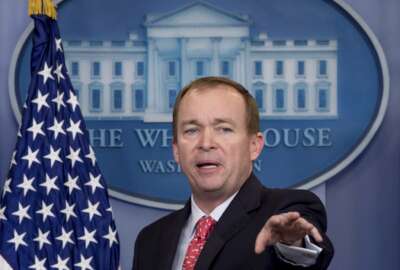
Bipartisan bill would let review board decide if IT vulnerabilities should be made public
In today's Federal Newscast, following the massive WannaCry ransomware cyber attack, a group of senators introduced legislation to set up a board to regulate...
- Sens. Ron Johnson (R-Wis.), Cory Gardner (R-Colo) and Brian Schatz (D-Hawaii) introduced the Protecting our Ability To Counter Hacking Act, a bipartisan bill which aims to address the vulnerability that led to the massive ransomware cyber attack called WannaCry. It would let a board headed by the Secretary of Homeland Security decide if a vulnerability discovered by a government agency should be made public or not. (Sen. Brian Schatz)
- Justice Department attorneys warned the Senate’s Veterans Affairs Accountability and Whistleblower Protection Act could run into the same constitutionality issues they found with the VA Choice Act. They said having a peer review of a senior executive’s disciplinary case may violate the appointments clause. Justice and VA said they could tweak the language and keep the intent of the bill intact. (Federal News Radio)
- A bill to limit how much time Veterans Affairs Department employees involved in direct patient care can spend on union business cleared the first congressional hurdle. The VETS Protection Act made it out of the House Veterans Affairs Committee with some changes. It now heads to the House for a vote. VA employees involved in direct patient care could only spend 25 percent of their work hours on official time under it. The bill also extends the probationary period for VA employees from one to two years. (House Veterans Affairs Committee)
- The legislation to modernize federal technology crossed a second major hurdle. The ball is now in the Senate’s court to get agencies off of legacy IT systems. The House passed the Modernizing Government Technology Act by voice vote yesterday. The bill would set up a working capital funds for each agency to stockpile savings from moving off of old systems and applications. It also authorizes a $500 million central fund that agencies could apply for to address large scale or interagency modernization efforts. In the meantime, OMB is preparing for the MGT Act’s central fund by developing metrics for agency business cases. (Rep. Will Hurd)
- The House Oversight and Government Reform Committee is taking a look at federal compensation and how it compares to the private sector. Government Operations Subcommittee Chairman Mark Meadows (R-N.C.) said the federal compensation system is expensive and doesn’t meet the needs of a younger workforce. The Heritage Foundation and American Enterprise Institute will suggest Congress change the federal retirement package. It’s more generous than most private sector options. (Federal News Radio)
- The pace of immigration enforcement has been on the rise. Now a federal and local task force landed a blow on a violent gang. Immigration and Customs Enforcement reported arresting 41,000 illegal immigrants through April, a third more than in the same period last year. It said 75 percent were convicted criminals. Bureau of Alcohol, Tobacco, Firearms and Explosives agents teamed with Los Angeles authorities to nab 20 bosses of MS-13. Officials said most were in the country illegally. (Bureau of Alcohol, Tobacco, Firearms, and Explosives)
- A Navy admiral was sentenced to 18 months in prison for lying to investigators about his relationship with Glenn Defense Marine Asia owner Leonard Francis, or Fat Leonard. Rear Adm. Robert Gilbeau pleaded guilty last year to making false statements. Gilbeau is the highest ranking Navy officer to be sentenced out of the 20 current and former officials charged in the investigation so far. (Federal News Radio)
- Despite an increasingly digital government, the Government Publishing Office is still finding business with paper. GPO Director Davita Vance-Cooks, said revenue is up for print services. But that doesn’t mean the office is ignoring modernization. Vance-Cooks told a congressional committee the office hopes to digitize the entire congressional record by next year. Later this year, GPO is also launching a new automated print procurement system.
Copyright © 2025 Federal News Network. All rights reserved. This website is not intended for users located within the European Economic Area.
Eric White
Eric White is news anchor and Federal Drive producer at Federal News Network.
Follow @FEDERALNEWSCAST
Related Stories
Related Topics





